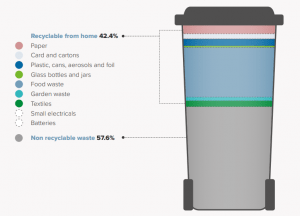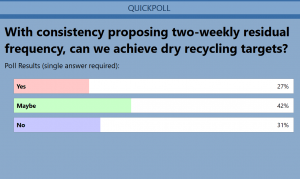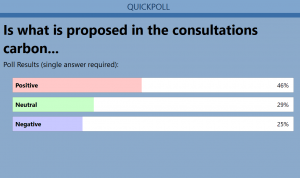What will be the impact of consistent collections on EPR?
27th May 2021
What will be the impact of consistent collections on EPR?
After eight weeks of consultation frenzy, reading, re-reading and commenting on the EPR and DRS proposals, the end of the consultation period is almost upon us. Our analysis and assessment period has been impacted by the consistent collection policy reform consultation being delayed by almost four weeks during the local election period, which is why we decided that our final e-workshop should focus on consistency and how it interfaces with both EPR and DRS reforms. The intention being, it will help us all consider how the three sets of policy proposals sit together just ahead of our final week of thinking, writing and submission.
Our panel
I was lucky to be the chair of another excellent panel with two SUEZ recycling and recovery UK customers, Kristy Spindler from South Gloucestershire Council and Michael Travers from the University of Southampton, joining my colleague Stuart Hayward-Higham in setting the scene and answering questions raised by the audience.

First up was Kristy, bringing her local authority perspective to the discussion, and on the whole, she was positive about the EPR principles and proposals. South Gloucestershire Council have gone through significant service enhancements in recent years with food waste collections and chargeable green waste collections from 50% of their properties. But these improvements do raise concerns in terms of some of the policy proposals in consistent collection, namely a weekly food waste mandatory collection, with her experience showing that the dominant material stream in the residual bin across the district is still food waste – so mandating food waste collections is no guarantee of consumer support. With regards to free green waste collections from all properties she expected this to double the cost of her existing opt-in service as she would need to expand the collection fleet. However, her biggest worry was the uncertainty around payments and income and how this fits with her five year budget cycle. She also identified planning worries in terms of getting new infrastructure up and running in time, and is currently working with her elected members to warm them up for all of the potential service and facility impacts and decisions that will need to be made from 2024 onwards.

South Gloucestershire residual waste composition (2019)
Next up was Mike, who brought a business perspective to the debate as University of Southampton is one of our commercial customers, who are due out to tender for their mixed recycling service this year. He commented “not ideal given all the policy reforms that are coming over the hill!” The University have been segregating food waste for almost 10 years on their campus and it goes to AD for processing, but this end market wasn’t keen on accepting Vegware type products and he hopes that the policy reforms will help expand markets and build local markets in particular. The University are confident of operating within the new systems (EPR in particular) with all the additional data needs and evidence reporting. For a number of years, they have operated a pay by weight service and have found the data very useful in helping them drive behaviour change and improve efficiency. As an aside, Mike was quite positive about the plans for DRS as this should take materials out of their commercial recycling collections, thus saving them money. He was concerned about just how informed and prepared his students would be to change their behaviours in the future in terms of on-pack labelling, with some materials going through kerbside recycling and others going through DRS only for instance. Mike referenced the fact that he already has contamination issues with the simple all in recycling service today, so dealing with this when the systems are more complex and some of the messaging isn’t aligned might be a growing issue for him and many others.
Last up was Stuart bringing his unique insights and visual interpretations to some of the key areas that he feels need addressing in the existing proposals. He was quick to focus on the need for all the actors (both old and new, including central government, the yet to be formed scheme administrator, local government and the brands) to understand their role in engaging consumers/businesses in preparing for the changes in regulation and services, and to support them during the transition. Even with a planned move to binary labelling (recycle or not) things will never be that simple, as some labelling will have to show that the material is part of DRS only, whilst others will be kerbside specific. There will always be a need for locally specific messaging from the local authority to help businesses and consumers to get it right.
Stuart’s other big topic was TEEP and how the proposals at the moment are retaining the responsibility on the waste contractor to submit any TEEP exemptions rather than on the business itself. Businesses could choose to ignore the contractors advice on a service (source segregation being the preferred solution) and select a mixed recycling collection with a contractor who would prepare a TEEP exemption! Overall, Stuart was positive about the direction of travel for most of the policy reforms, but he is concerned about some of the timetables being proposed, the misalignment of some delivery windows, and the slippage that has already happened. This means there is little real time for preparing and planning before the scheme goes live, once the regulations are in place and the Scheme Administrator is appointed. This concern was shared by all the panellists and many in the audience who sent in comments and thoughts.
What did the audience think?
We opened up the poll questions with a focus on TEEP, given the interest already shown in the discussions, and the audience were strongly in favour of a business being ‘required to buy services in accordance with TEEP’ (89%) – our panel were equally in favour saying that laws and regulations exist for a reason, so we should be required to follow them.
The second question picked up an earlier point raised by Kristy concerning the potential impact of two-weekly residual waste collections on future recycling performance. The audience were asked can we achieve our dry recycling targets if two weekly residual waste collections become the standard? Only 27% were convinced they would be met, whilst 31% were sure they wouldn’t. The frequency of collection is important for driving up recycling, but so is capacity in the residual bin, as in South Gloucestershire, where residual waste bins are smaller thus encouraging residents to think about what they discard. Stuart strongly believes that in many parts of the UK four weekly residual waste collections will be critical in driving higher recycling performance.

To follow up on this we asked ‘what would you do to guarantee hitting targets’? and many in the audience felt it was a mix of both options presented – reducing frequency of collection (55%) or reducing residual bin capacity (45%). The panel concurred that it was a mix of both, but frequency of collection is a more compelling driver for food waste than for dry recycling.
When asked whether ‘weekly food waste collections are the death of IVC’ (In-vessel composting), following up a point made by Stuart earlier that most IVCs need a mix of green and food waste to operate properly, 58% said yes. Kristy is currently sending her food waste to AD, as is Mike, whilst Stuart suggested that weekly food waste one week and a mix of food and garden waste the next might enable IVC facilities to continue to play a role. However, that would require a change in the proposed policy from DEFRA, so this is something that we must feedback on during our consultation responses if we feel strongly about it. And what would this mean for compostable packaging like Vegware if IVC facilities generally come under threat because of changes in collections preference?
Thankfully the audience felt the portfolio of policy proposals would deliver a carbon positive result, which is partly what they have been designed to do. While not all proposals were considered to be carbon positive, overall they should deliver improvements, but not everyone agreed.
General discussion
 Following the polls there was time to pick up a few of the wider reaching questions. The first concerned the news that drinks caps must be on the packaging containers to get the deposits back through reverse vending solutions. The panel felt tagged lids in the future might be part of the solution, so they can be captured through the system, whilst others noted that tethered lids might solve this problem for many people and circumstances. Mike thought the students would do it if it meant they got their money back, whilst Kristy felt this was a red-herring, after all capturing the bottles is much more important from a recycling, resource and carbon perspective than the lids. As Kristy stated, we must do all we can to make recycling and participation as easy as possible.
Following the polls there was time to pick up a few of the wider reaching questions. The first concerned the news that drinks caps must be on the packaging containers to get the deposits back through reverse vending solutions. The panel felt tagged lids in the future might be part of the solution, so they can be captured through the system, whilst others noted that tethered lids might solve this problem for many people and circumstances. Mike thought the students would do it if it meant they got their money back, whilst Kristy felt this was a red-herring, after all capturing the bottles is much more important from a recycling, resource and carbon perspective than the lids. As Kristy stated, we must do all we can to make recycling and participation as easy as possible.
Another question that was raised by a few audience members concerned proposals in the consistent collections consultation around zoning, and although all of the panellists could see the benefits of capturing all business related target packaging in a geographical ‘area’ through one contractor/service they all felt that not enough work had been done on this approach for it to be a serious contender in this round of consultation responses. More effort would be needed in the coming months and years to work this up if plans for consistent collections don’t deliver as expected.
When asked to summarise where we are from their perspective, the panel were very open and honest. Mike firmly believes that consistent collections are key in delivering higher recycling performance and that on the whole the proposals across EPR and consistency are pushing in the right direction. Kristy agreed, and said in the short term we must focus on our responses and for preparing for the inevitable changes that are coming. Stuart confirmed that the system is becoming increasingly complex and that we must understand this before submitting any consultation response.
Next steps?
As always, I learned plenty from the panellists, the audience engagement and the discussions, so a huge thank you to everyone for their involvement.
With a week to go, we must lock ourselves away and ensure we have given the consultation documents enough time and effort to do them justice. These reforms will be the biggest our sector has witnessed and will shape packaging and resource management for a generation or more, so let’s not short change this, even if we are all busy with front line service delivery or other day-to-day operations.
The art of using the next week to its maximum is speak to your peers, your trade bodies and your value chain (customers and suppliers alike) to see what common concerns there are and where the quick wins might be. When filling in the consultation responses, don’t tick a box and then caveat it with commentary – a ‘yes’ will be a ‘yes’ even if you explain in the text box that only under certain circumstances this will apply. Remember, DEFRA can only adapt their proposals if they hear back from as many stakeholders as possible, so please get involved and take care when submitting your responses.
The future of our sector, how it works, who is responsible, and what materials are targeted is very much in your hands, so don’t waste the opportunity to be heard. I’m off to flesh out some of my responses based on our productive online discussions this week!
Blog by Dr. Adam Read, Director of External Affairs, SUEZ recycling and recovery UK.
If you would like to watch the webinar back, or view any of the previous sessions they are all available here.
Tweet